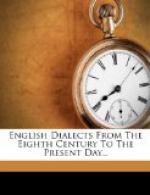The Harnet and the Bittle.
A harnet zet in a hollur tree—
A proper spiteful twoad was he;
And a merrily zung while he did zet
His stinge as shearp as a bagganet;
Oh, who so vine and bowld
as I?
I vears not bee, nor wapse,
nor vly!
A bittle up thuck tree did clim,
And scarnvully did look at him;
Zays he, “Zur harnet, who giv thee
A right to zet in thuck there tree?
Vor ael you zengs so nation
vine,
I tell ’e ‘tis
a house o’ mine!”
The harnet’s conscience velt a twinge,
But grawin’ bowld wi’ his
long stinge,
Zays he, “Possession’s the
best laaw;
Zo here th’ sha’sn’t
put a claaw!
Be off, and leave the tree
to me,
The mixen’s good enough
for thee!”
Just then a yuckel, passin’ by,
Was axed by them the cause to try;
“Ha! ha! I zee how ’tis!”
zays he,
“They’ll make a vamous munch
vor me!”
His bill was shearp, his stomach
lear,
Zo up a snapped the caddlin’
pair!
Notes.—Observe
z and v for initial s and f;
harnet,
hornet; bittle, beetle;
zet, sat; proper, very; twoad,
toad, wretch; a, he;
stinge, sting; bagganet, bayonet.
Thuck, that; clim, climb; giv, gave; zet, sit; ael, all.
Th’ sha’sn’t, thou shalt not; mixen, dung-heap.
Yuckel, woodpecker;
axed, asked; vamous munch, excellent
meal; lear, empty;
caddlin’, quarrelsome.
SOUTHERN (Group 3): ISLE OF WIGHT.
The following colloquy is quoted in the Glossary
of Isle of Wight
Words, E.D.S., 1881, at p. 50.
I recollect perfectly the late Mr James Phillips of Merston relating a dialogue that occurred between two of his labourers relative to the word straddle-bob, a beetle.... At the time of luncheon, one of them, on taking his bren-cheese (bread and cheese) out of a little bag, saw something that had found its way there; which led to the following discourse.
Jan. What’s got there, you?
Will. A straddlebob craalun about in the nammut-bag.
J. Straddlebob? Where ded’st leyarn to caal ’n by that neyam?
W. Why, what shoud e caal ’n? ’Tes the right neyam, esn ut?
J. Right neyam? No! Why,
ye gurt zote vool, casn’t zee ’tes a
dumbledore?
W. I know ’tes; but vur aal
that, straddlebob’s zo right a
neyam vor ’n as dumbledore ez.
J. Come, I’ll be blamed if I doant laay thee a quart o’ that.
W. Done! and I’ll ax Meyastur
to-night when I goos whoam, bee’t
how’t wool.
Accordingly, Meyastur was applied to by
Will, who made his decision
known to Jan the next morning.




